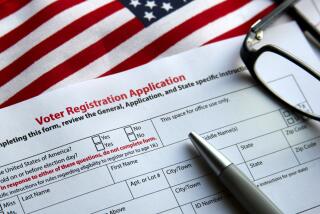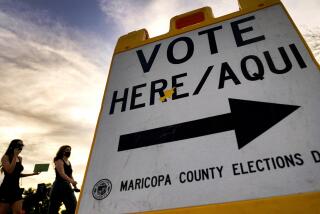Voting rights bill deemed unconstitutional
WASHINGTON, D.C. — Justice Department lawyers concluded in an unpublished opinion this year that the historic Washington, D.C., voting rights bill pending in Congress is unconstitutional, according to sources briefed on the issue. But Atty. Gen. Eric H. Holder Jr., who supports the measure, ordered a second opinion from other department lawyers and determined that the legislation would pass muster.
A finding that the voting rights bill runs afoul of the Constitution could complicate an upcoming House vote and make the measure more vulnerable to a legal challenge that probably would reach the Supreme Court if it is enacted. The bill, which would give Washington, D.C., a vote in the House for the first time, appeared to be on the verge of passing last month before stalling when pro-gun legislators tried to attach an amendment weakening city gun laws. Supporters say it could reach the House floor next month.
In deciding that the measure is unconstitutional, lawyers in the department’s Office of Legal Counsel matched a conclusion reached by their Bush administration counterparts nearly two years ago, when a lawyer testified that a similar bill would not withstand legal attack.
Holder rejected the advice and sought out the opinion of the solicitor general’s office, where lawyers told him that they could defend the legislation if it were challenged after its enactment.
Democratic and Republican Justice Department veterans said it is unusual, though not unprecedented, for the solicitor general, who defends the administration’s position before the Supreme Court, to be asked to weigh in before a case makes its way into a courtroom.
Through a spokesman, Holder portrayed the basis for his override of the Office of Legal Counsel’s ruling as grounded in law, not politics.
“The attorney general weighed the advice of different people inside the department as well as the opinions of legal scholars, and made his own determination that the D.C. voting rights bill is constitutional,” spokesman Matthew Miller said. “As the leader of the department, it is his responsibility to make his best independent legal judgment, and he believes that although there are reasonable arguments on both sides of the issue, ultimately the bill would constitutionally grant D.C. residents a right to elect a voting representative in Congress.”
Questions over the constitutionality of a D.C. voting bill have dogged the proposal throughout its journey through Congress. Some legal experts say that because Washington, D.C., is not a state, the proposal does not square with a constitutional requirement that House members be chosen “every second year by the people of the several states.” Others argue that the Constitution gives Congress broad power over the district, including the power to grant it a full House seat.
The measure would create two new permanent seats in the House, one for Washington, D.C., and one for Utah, although that seat could transfer to a different state based on the results of the 2010 Census.
More to Read
Get the L.A. Times Politics newsletter
Deeply reported insights into legislation, politics and policy from Sacramento, Washington and beyond. In your inbox three times per week.
You may occasionally receive promotional content from the Los Angeles Times.










